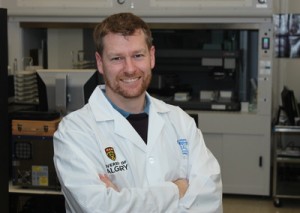University of Calgary Researcher Awarded $250,000 to Advance Work into Mitochondria and Childhood Disease

Timothy Shutt, a researcher at the University of Calgary, was recently awarded $250,000 through the Canada Foundation for Innovation’s (CFI) John R. Evans Leaders Fund (JELF) to advance research focused on the role of mitochondria in childhood diseases.
Mitochondria are specialized structures unique to cells that serve as energy sources, powering various functions of the cell and the organism as a whole. Impaired mitochondria are be crucial factors in conditions like epilepsy, childhood autism spectrum disorder, and the effects of traumatic brain injury.
Dr. Shutt is working on identified and unidentified genes that cause impairments and disease at the Metobolic Disorders Clinic at the Alberta Children’s Hospital, and hoping to translate his research findings into new therapeutics for patients with mitochondrial diseases.
“Talented scholars like Tim Shutt make possible new and improved treatments for childhood conditions,” said Ed McCauley, vice president (research), in a news release. “This support from the Canada Foundation for Innovation will elevate Dr. Shutt’s capacity for important discoveries that will inform better health outcomes for children.”
Dr. Shut will use the award to equip his lab with the latest technology: microscopy with high spatial and temporal resolution, and tissue culture capabilities. The capacity to picture mitochondria in living cells with as much resolution as possible is fundamental to understanding the mechanisms that regulate their function.
“I am very pleased to receive this CFI award because it will allow us to push the field of mitochondrial research in new directions — with an eye on discovering new treatments for childhood illnesses,” said Dr. Shutt, who completed his postdoctoral research at Yale University and the Ottawa Heart Institute, and is an assistant professor of medical genetics and biochemistry and molecular biology at Calgary’s Cumming School of Medicine.
JELF offers institutions the opportunity to acquire foundational infrastructures for their leading research faculty, in order to undertake or further cutting-edge research.
Mitochondrial diseases are sometimes (about 15% of the time) caused by mutations in the mitochondrial DNA that affect mitochondrial function. Other causes of mitochondrial disease are mutations in genes of the nuclear DNA, whose gene products are imported into the mitochondria (mitochondrial proteins), as well as acquired mitochondrial conditions. Mitochondrial diseases take on unique characteristics, both because of the way the diseases are often inherited and because mitochondria are so critical to cell function.







